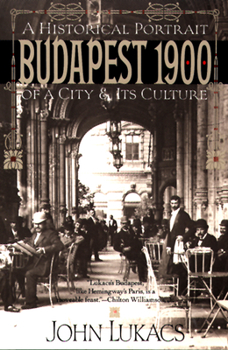Book Overview
Lukacs's book is a lyrical, sometimes dazzling, never merely nostalgic evocation of a glorious period in the city's history. . . . {His} true sympathy lies . . . not with the famous expatriates, but with the writers and intellectuals who lived and died at home: the poets Endre Ady and Mihaly Babits; the novelists Ferenc Herczeg, Sandor Hunyady, Frigyes Karinthy, Dezso Kosztolanyi, Gyula Krudy, Kalman Mikszath, and Zsigmond Moricz; the political essayist...
Format:Paperback
Language:English
ISBN:0802132502
ISBN13:9780802132505
Release Date:February 1994
Publisher:Grove Press
Length:288 Pages
Weight:1.00 lbs.
Dimensions:0.8" x 6.8" x 8.5"
Related Subjects
Non-Fiction Cultural Diversity Social Change Austria Central Eastern Europe History Hungary IrelandCustomer Reviews
5 ratings
A window to my grandfather's world
Published by Thriftbooks.com User , 14 years ago
My grandfather was born in Hungary just after 1900 (I was born and raised in the US) - I found the book to be a real insight into the character of the people and times. It tied together many of the stories I had heard and shed light on a culture that was a large part of him. The writing is sometimes a little dry - but it is worth persevering.
The Souring of Nationalism
Published by Thriftbooks.com User , 20 years ago
This is another book that deserves to be put back into print. Throughout a long and productive career, John Lukacs has taken pride (sometimes bordering on preening) in his penchant for defining things his own way. Sometimes it works, sometimes it just a distraction. But no subject is better suited to his mix of talents than this "historical portrait" (as he puts it) of this the capital of his native country.The book is a nostalgia trip in part, but it is a good deal more. Lukacs also undertakes to to situate Budapest in the Austro-Hungarian Empire and in particular, in contrast to its great partner, Vienna -- it's remarkable even today how these two cities, so close together on the map can seem so far apart.But perhaps the best part of the book is in his chapter on "Seeds of Trouble," when he undertakes to show how liberal nationalism went sour and headed down the road to anti-semitism and the destructive hyper-nationalism that wracked us all through so much of the 20th century. Liberal nationalism had always contained the seeds of its own undoing. Discerning politicians as disparate as Disraeli, Bismark and Napoleon III had already grasped how the liberal impulse could be harnessed to conservative ends. But through Lukacs' eyes, you can see just how quick and subtle -- and disastrous -- the shift can be. Probably the point is that Lukacs was never a good liberal to begin with. So he can look on with unblinkered eyes as the liberal vision crumbles in his hands.For all of Lukacs' aristocratic disdain, it is possible for a reader less austere than the author to see this shift as a disaster. Perhaps a good pairing for this book would be Gordon A. Craig's "Triumph of Liberalism" about Zurich in a slightly earlier time: there you can be reminded (if you need reminding) of just how refreshing the rise of liberalism could be.Lukacs has a final chapter called "Since Then," but it's perfunctory. There's certainly a story to be told about 20th Century Budapest, but you wouldn't come here to find it. On the other hand, as an exercise in archaeology -- of the substrate that underlies our more recent battles -- this book is hard to beat.
Bravo!
Published by Thriftbooks.com User , 21 years ago
Reading this book took me on a trip to an age when things were golden. I was able to see places I have been and picture myself in those times. The christian-jewish relationships were a model that can be likened-to today's America. I enjoyed the section about the coffeehouse district and also the author's footnotes. I learned a lot of things I did not know about political sides and issues.Anyone thinking of buying this book will be pleased with their purchase. I have read "An Undiplomatic Diary", by an american General after WWI. I would like to read about Emperor Karl 1st, the "Peace Emperor". This combination of books bring about a rounded history. I am sure that there are other books to read, but these are pretty good places to start.The last chapter tied everything together and was very strong.Bravo! Is there another chapter about the last 14 years or so?
A stylist, especially in his footnotes!
Published by Thriftbooks.com User , 23 years ago
Lukacs attempts to capture the mental climate of Budapest 1900. This is a kind of impressionistic approach to history that uses scholarship to achieve its effects. He is definitely worth reading.
When Budapest was king....
Published by Thriftbooks.com User , 26 years ago
For a brief interlude at the turn of the century, Budapest was physically and culturally the fastest growing city in Europe. In a style which is informative without being pedantic, the author creates the city as protagonist, reacting to the historical and personal forces which it confronts. Highly recommended...





